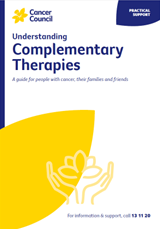- Home
- Cancer Information
- Advanced cancer
- Facing end of life
- Common questions about dying
- Could complementary therapies help me?
Could complementary therapies help me?
If your doctor has told you that the cancer cannot be cured, you may wonder whether there are any other therapies you could try. Complementary therapies tend to focus on the whole person, not just the cancer. They are used alongside conventional medical treatments, to help people feel better and cope with cancer and its treatment. This is also true for people who are dying with cancer.
Complementary therapies may help you relax and reduce anxiety. They can also be useful in managing symptoms such as pain and nausea. Some people find gentle therapies, such as massage and aromatherapy, helpful. People who find it uncomfortable or painful to be touched may prefer meditation or visualisation.
Talk to your doctor about what complementary therapies are right for you, as some may interact with your cancer treatment, make side effects worse, or affect the cancer treatment’s success.
For more on this, see Complementary therapies.
Alternative therapies are different to complementary therapies
They are used instead of approved medical treatment, and are often promoted as cancer cures. Family, friends or strangers may suggest you try alternative therapies when they hear of your prognosis. Unlike conventional medical treatments, many alternative therapies have not been scientifically tested, so there is no proof they stop cancer growing or spreading. Others have been tested and shown to be harmful. They may be very expensive and could interfere with other medicines.
If you are considering trying an alternative therapy, discuss this with your doctor first. Cancer Council does not recommend the use of alternative therapies as a treatment for cancer.
→ READ MORE: What does “dying well” mean?
Podcast: Living Well with Advanced Cancer
Listen to more of our podcast for people affected by advance
More resources
Prof Jane Phillips, Head, School of Nursing and Professor, Centre for Healthcare Transformation, Queensland University of Technology and Emerita Professor Palliative Nursing, University of Technology Sydney, NSW; Prof Meera Agar, Palliative Care Physician, Professor of Palliative Medicine, University of Technology Sydney, IMPACCT, Sydney, NSW; Sandra Anderson, Consumer; A/Prof Megan Best, The University of Notre Dame Australia and The University of Sydney, NSW; Prof Lauren Breen, Psychologist and Discipline Lead, Psychology, Curtin University, WA; David Dawes, Manager, Spiritual Care Department, Peter MacCallum Cancer Centre, VIC; Rob Ferguson, Consumer; Gabrielle Gawne-Kelnar, Counsellor, Psychotherapist and Social Worker, One Life Counselling & Psychotherapy, NSW; Justine Hatton, Senior Social Worker, Southern Adelaide Palliative Services, Flinders Medical Centre, SA; Caitlin MacDonagh, Clinical Nurse Consultant, Palliative Care, Royal North Shore Hospital, Northern Sydney Local Health District, NSW; McCabe Centre for Law and Cancer; Palliative Care Australia; Belinda Reinhold, Acting Lead Palliative Care, Cancer Council QLD; Xanthe Sansome, National Program Director, Advance Care Planning Australia; Kirsty Trebilcock, 13 11 20 Consultant, Cancer Council SA.
View the Cancer Council NSW editorial policy.
View all publications or call 13 11 20 for free printed copies.
Need to talk?
Support services
Caring for someone with cancer
Speak to a health professional or to someone who has been there, or find a support group or forum
Cancer Council Online Community
A community forum – a safe place to share stories, get tips and connect with people who understand
Cancer information
Holistic approaches to health care
Learn about complementary therapies that are part of holistic systems such as naturopathy and traditional Chinese medicine
Advanced cancer
Information for all stages of advanced cancer, from the initial diagnosis to palliative care and grief

